|
2010 • 2011 • 2012 • 2013 • 2014 • 2015
* Indicates that the film/performance was not nominated for an Academy Award in this category
| |
 |
The King's Speech
Actor: Colin Firth (The King's Speech)
Actress: Natalie Portman (Black Swann)
Supporting Actor: Christian Bale(The Fighter)
Supporting Actress: Melissa Leo (The Fighter)
Director: Tom Hooper (The King's Speech) |
The Social Network
Actor: Colin Firth (The King's Speech)
Actress: Natalie Portman (Black Swann)
Supporting Actor: Christian Bale(The Fighter)
Supporting Actress: Melissa Leo (The Fighter)
Director: David Fincher (The Social Network) |
|
Hindsight Award nominations for 2010
|
| 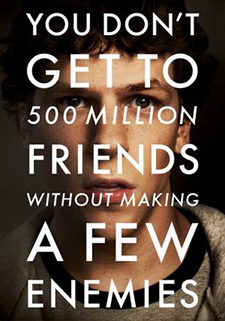 The King's Speech is
a moving, superbly-made drama about England's George V's struggles with a debilitating speech impediment, having the crown thrust unexpectedly on his head after the abdication of his brother, and the oncoming threat of the Nazis; all with the help of his quirky yet compassionate speech therapist. It features superb performances by Geoffrey Rush at the therapist, Helena Bonham Carter as the queen, Derek Jacobi as Archbishop Cosmo Lang, and a magnificent tour de force by Colin Firth as the king. It is a wonderful addition to the Oscar pantheon, but is is the most deserving? The ultimate answer is a tenuous "no," because while there isn't a lot to criticize about The King's Speech, a word that its impressive production and tasteful execution can't escape is "conventional". There is no question that in a lot of years, The King's Speech would have been our runaway winner for Best Picture, but 2010 happened to be a year where a a handful of films were equally moving and entertaining but rose the bar by challenging their audience in a way that The King's Speech's well-structured formalism couldn't compete with. The King's Speech is
a moving, superbly-made drama about England's George V's struggles with a debilitating speech impediment, having the crown thrust unexpectedly on his head after the abdication of his brother, and the oncoming threat of the Nazis; all with the help of his quirky yet compassionate speech therapist. It features superb performances by Geoffrey Rush at the therapist, Helena Bonham Carter as the queen, Derek Jacobi as Archbishop Cosmo Lang, and a magnificent tour de force by Colin Firth as the king. It is a wonderful addition to the Oscar pantheon, but is is the most deserving? The ultimate answer is a tenuous "no," because while there isn't a lot to criticize about The King's Speech, a word that its impressive production and tasteful execution can't escape is "conventional". There is no question that in a lot of years, The King's Speech would have been our runaway winner for Best Picture, but 2010 happened to be a year where a a handful of films were equally moving and entertaining but rose the bar by challenging their audience in a way that The King's Speech's well-structured formalism couldn't compete with.
 The most challenging of these is director David Fincher and screenwriter Aaron Sorkin's marvelously original account of the rise of Facebook mastermind Mark Zuckerberg, The Social Network. The film depicts Facebook's founding fathers Zuckerberg, Eduardo Saverin and Sean Parker (a superbly-cast Jesse Eisenberg, Andrew Garfield and Justin Timberlake) as self-obsessed, opportunistic swine who manage to change the foundation of how human interaction works while suing each other and being sued by pretenders to the throne like entitled, billionaire identical twins (another masterful performance by Armie Hammer) who Zuckerberg met briefly in college and feel that as a result, they should own his achievements; all while employing a mind-bending chronology that results in a Rashomon-like display that keeps the viewer guessing as to who is telling the truth and who is embellishing it like a Facebook status about your family vacation. Through some alchemy, Fincher and Sorkin managed to present these loathsome characters as not only compelling, but ultimately even touching and likable. The Social Network was named Best Picture by both the Los Angeles and New York Film Critics Association but when it came time to hand out the Oscars, the momentum had inevitably swung to the superbly made (if far less demanding) The King's Speech. It was a nice, safe choice that Academy members could compliment each other for their impeccable taste on their Facebook feeds the next morning. The most challenging of these is director David Fincher and screenwriter Aaron Sorkin's marvelously original account of the rise of Facebook mastermind Mark Zuckerberg, The Social Network. The film depicts Facebook's founding fathers Zuckerberg, Eduardo Saverin and Sean Parker (a superbly-cast Jesse Eisenberg, Andrew Garfield and Justin Timberlake) as self-obsessed, opportunistic swine who manage to change the foundation of how human interaction works while suing each other and being sued by pretenders to the throne like entitled, billionaire identical twins (another masterful performance by Armie Hammer) who Zuckerberg met briefly in college and feel that as a result, they should own his achievements; all while employing a mind-bending chronology that results in a Rashomon-like display that keeps the viewer guessing as to who is telling the truth and who is embellishing it like a Facebook status about your family vacation. Through some alchemy, Fincher and Sorkin managed to present these loathsome characters as not only compelling, but ultimately even touching and likable. The Social Network was named Best Picture by both the Los Angeles and New York Film Critics Association but when it came time to hand out the Oscars, the momentum had inevitably swung to the superbly made (if far less demanding) The King's Speech. It was a nice, safe choice that Academy members could compliment each other for their impeccable taste on their Facebook feeds the next morning.
|
| Worst Award
 The
Oscar for Live Action Short is frequently criticized as being obsolete and showcasing nothing more than cheaply-made student films. This has been rarely more the case than with the selection of Luke Matheny's thesis project at NYU film school, God of Love, an eighteen minute sitcom about a darts player who becomes Cupid when when he comes across a magic box of darts. The Academy gives out Student Academy Awards to encourage this kind of effort (which God of Love also won) but Matheny's was the weakest and most trivial of any of the nominees that year. The Oscar probably should have gone to Na Wewe, a hair-raising account of the civil war in Burundi. But the Academy was only interested in making safe choices in 2010, and God of Love was about as dangerous as an old episode of Love, American Style. The
Oscar for Live Action Short is frequently criticized as being obsolete and showcasing nothing more than cheaply-made student films. This has been rarely more the case than with the selection of Luke Matheny's thesis project at NYU film school, God of Love, an eighteen minute sitcom about a darts player who becomes Cupid when when he comes across a magic box of darts. The Academy gives out Student Academy Awards to encourage this kind of effort (which God of Love also won) but Matheny's was the weakest and most trivial of any of the nominees that year. The Oscar probably should have gone to Na Wewe, a hair-raising account of the civil war in Burundi. But the Academy was only interested in making safe choices in 2010, and God of Love was about as dangerous as an old episode of Love, American Style. |
Biggest Oversight
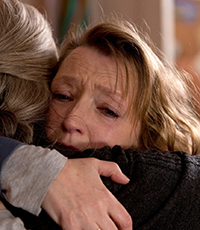 Lesley Manville won the Best Actress award from the National Board of Review for her stellar performance as a neurotic woman looking for love in all the wrong places in Mike Leigh's Another Year, an actress and a film that were too obscure to catch the Academy's attention when superstars like Natalie Portman, Annetter Bening and Nicole Kidman and up-and-coming ingénues like Michelle Williams and Jennifer Lawrence were available to honor. We're not really criticizing Oscar's Final Five because they all gave impressive performances but none had more complexity than Manville's unforgettable depiction of an old friend of a compassionate family who becomes so needy and destructive that she tears the relationship apart. Manville isn't the household name that Natalie Portman or Jennifer Lawrence are but anyone who saw her work in Another Year will never forget her. It's a shame that those numbers weren't quite at a level to win the Academy's attention. Lesley Manville won the Best Actress award from the National Board of Review for her stellar performance as a neurotic woman looking for love in all the wrong places in Mike Leigh's Another Year, an actress and a film that were too obscure to catch the Academy's attention when superstars like Natalie Portman, Annetter Bening and Nicole Kidman and up-and-coming ingénues like Michelle Williams and Jennifer Lawrence were available to honor. We're not really criticizing Oscar's Final Five because they all gave impressive performances but none had more complexity than Manville's unforgettable depiction of an old friend of a compassionate family who becomes so needy and destructive that she tears the relationship apart. Manville isn't the household name that Natalie Portman or Jennifer Lawrence are but anyone who saw her work in Another Year will never forget her. It's a shame that those numbers weren't quite at a level to win the Academy's attention.
|
Return
to top
1920s •
1930s •
1940s •
1950s •
1960s •
1970s •
1980s • 1990s • 2000s
| |
 |
The Artist
Actor: Jean Dujardin (The Artist)
Actress: Meryl Streep (The Iron Lady)
Supporting Actor: Christopher Plummer (Beginners)
Supporting Actress: Octavia Spencer
(The Help)
Director: Michel Hazardousness (The Artist) |
Hugo
Actor: George Clooney ( The Descendants)
Actress: Rooney Mara (The Girl with the Dragon Tattoo)
Supporting Actor: Christopher Plummer (Beginners)
Supporting Actress: Octavia Spencer
(The Help)
Director: Martin Scorsese (Hugo) |
|
Hindsight Award nominations for 2011
|
| 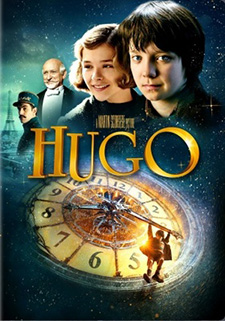 It's hard to fault the Academy for their selection of The Artist as Best Picture after accusing them of cowardice the previous year. The Artist was, after all, an incredibly risky endeavor of a full-fledged silent movie shot in the look and style of films of the 1920's (unlike Mel Brooks' 1976 novelty Silent Movie) and we have to admire a movie whose likes hadn't been seen in over 80 years. But to judge the true quality of The Artist, we shouldn't compare it to contemporary fare like Hugo or The Descendants, but rather to films of the late silent era that The Artist is an homage to. And compared with late-era silent classics like Sunrise, The Cameraman and The Gold Rush, The Artist simply ceases to exist. Its story centers around a popular star in silent films (Jean Dujardin giving a laudable impression of Douglas Fairbanks, Sr.) who refuses to compromise his "art" with the advent of sound until his life is brought to the abyss of despair only to be rescued by his impossibly cute dog and a young actress he discovered and fell in love with when he was on top who became a superstar in early talkies. If all this sounds familiar, it's because the story is an uncredited remake of the Fredric March/Janet Gaynor version of A Star is Born, which was a retread of previously used material in 1937 and has been remade so many times that one gets sleepy-eyed trying to count its spin-offs. And ironically, Dujardin's "artistry" is nothing more than hack work, since even the films the character makes at the height of his fame are pandering nonsense aimed at popular box office success (the dog performs tricks for the audience when Dujardin is at the top of his profession; you never saw that kind of crap from Maria Falconetti). So while we admire the makers of The Artist's courage in taking the risk of bringing back the silent movie genre for one big-budget final breath, we aren't inclined to give the Best Picture award to a gimmick. It's hard to fault the Academy for their selection of The Artist as Best Picture after accusing them of cowardice the previous year. The Artist was, after all, an incredibly risky endeavor of a full-fledged silent movie shot in the look and style of films of the 1920's (unlike Mel Brooks' 1976 novelty Silent Movie) and we have to admire a movie whose likes hadn't been seen in over 80 years. But to judge the true quality of The Artist, we shouldn't compare it to contemporary fare like Hugo or The Descendants, but rather to films of the late silent era that The Artist is an homage to. And compared with late-era silent classics like Sunrise, The Cameraman and The Gold Rush, The Artist simply ceases to exist. Its story centers around a popular star in silent films (Jean Dujardin giving a laudable impression of Douglas Fairbanks, Sr.) who refuses to compromise his "art" with the advent of sound until his life is brought to the abyss of despair only to be rescued by his impossibly cute dog and a young actress he discovered and fell in love with when he was on top who became a superstar in early talkies. If all this sounds familiar, it's because the story is an uncredited remake of the Fredric March/Janet Gaynor version of A Star is Born, which was a retread of previously used material in 1937 and has been remade so many times that one gets sleepy-eyed trying to count its spin-offs. And ironically, Dujardin's "artistry" is nothing more than hack work, since even the films the character makes at the height of his fame are pandering nonsense aimed at popular box office success (the dog performs tricks for the audience when Dujardin is at the top of his profession; you never saw that kind of crap from Maria Falconetti). So while we admire the makers of The Artist's courage in taking the risk of bringing back the silent movie genre for one big-budget final breath, we aren't inclined to give the Best Picture award to a gimmick.
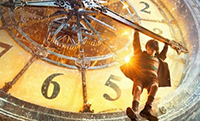 The real race comes down to the fore-mentioned Hugo and The Descendants. While we love Alexander Payne's tender drama of the executor of a massive piece of undeveloped coastland in Hawaii (the finest performance of George Clooney's career) who learns that the proposed developer of the estate had an affair with his wife before the accident that put her in a coma, the award goes by the wink of an eyelash to Hugo. Martin Scorsese's 3-D extravaganza of an orphaned boy who hides in the massive clockworks of a London train station while he tries to complete the project he and his late father had worked obsessively on for years contained vestigial clichés from a million other stories about plucky orphans, but infused with so much of Scorsese's mastery of filmmaking that the narrative was taken to a higher level than movies devoted to similar subjects. And when the hero of the tale turns out to be none other than silent film pioneer Georges Méliès, Hugo becomes even more of a tribute to the Golden Age of silent filmmaking than The Artist. And Méliès didn't even have a cute dog to distract us with. The real race comes down to the fore-mentioned Hugo and The Descendants. While we love Alexander Payne's tender drama of the executor of a massive piece of undeveloped coastland in Hawaii (the finest performance of George Clooney's career) who learns that the proposed developer of the estate had an affair with his wife before the accident that put her in a coma, the award goes by the wink of an eyelash to Hugo. Martin Scorsese's 3-D extravaganza of an orphaned boy who hides in the massive clockworks of a London train station while he tries to complete the project he and his late father had worked obsessively on for years contained vestigial clichés from a million other stories about plucky orphans, but infused with so much of Scorsese's mastery of filmmaking that the narrative was taken to a higher level than movies devoted to similar subjects. And when the hero of the tale turns out to be none other than silent film pioneer Georges Méliès, Hugo becomes even more of a tribute to the Golden Age of silent filmmaking than The Artist. And Méliès didn't even have a cute dog to distract us with.
|
Worst Award
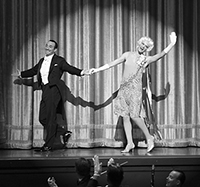 While we don't agree with a lot of Oscar's choices this year, we aren't thrown into a tizzy by them, either. We've already discussed our feelings about The Artist as Best Picture but at the same time, we get it. We would have honored Rooney Mara for her astonishing turn in The Girl with the Dragon Tattoo for Best Actress but on the other hand, if the Academy chose to give Meryl Streep the award every year, we could see the logic in that. So we'll focus on one of our pet peeves and zero in on the Costuming award for Mark Bridges of The Artist. It's not a bad choice; in fact, it's one we agreed with at the time. But having had a few years to chew on it, we're not really convinced that the film's standard issue 1920s tuxedos and flapper-wear were such extraordinary achievements. As we said above, if The Artist was released in a year when silent movies were actually the rage, its costuming wouldn't make any impact at all. But because the producers had the good sense to wait 80 years, Bridges got to take home an Oscar and that just doesn't seem right. The other nominees were, as usual, richly dressed period pieces and the winner among them probably should have been Michael O’Connor for Jane Eyre. But since we're always championing contemporary films for the category, the Hindsight Award goes to Trish Summerville for The Girl with the Dragon Tattoo. Lucky for her, Meryl Streep wasn't eligible. While we don't agree with a lot of Oscar's choices this year, we aren't thrown into a tizzy by them, either. We've already discussed our feelings about The Artist as Best Picture but at the same time, we get it. We would have honored Rooney Mara for her astonishing turn in The Girl with the Dragon Tattoo for Best Actress but on the other hand, if the Academy chose to give Meryl Streep the award every year, we could see the logic in that. So we'll focus on one of our pet peeves and zero in on the Costuming award for Mark Bridges of The Artist. It's not a bad choice; in fact, it's one we agreed with at the time. But having had a few years to chew on it, we're not really convinced that the film's standard issue 1920s tuxedos and flapper-wear were such extraordinary achievements. As we said above, if The Artist was released in a year when silent movies were actually the rage, its costuming wouldn't make any impact at all. But because the producers had the good sense to wait 80 years, Bridges got to take home an Oscar and that just doesn't seem right. The other nominees were, as usual, richly dressed period pieces and the winner among them probably should have been Michael O’Connor for Jane Eyre. But since we're always championing contemporary films for the category, the Hindsight Award goes to Trish Summerville for The Girl with the Dragon Tattoo. Lucky for her, Meryl Streep wasn't eligible.
|
Biggest Oversight
 Coriolanus was one of Shakespeare's tragedies which had never been made as a full-length theatrical film until Ralph Fiennes became obsessed with the idea of directing and starring in it. Fiennes wasn't able to get financial backing for his dream project until hunky heartthrob Gerard Butler agreed to take on the secondary role of Tullus Aufidius, enabling Fiennes to put together one of the greatest Shakespearean films ever assembled. It's a mystery that this brilliantly made version of a neglected classic failed to make more impact than it did or that its star didn't win (or was even nominated for) a single major award for his magnificent performance, with the Oscars choosing instead to honor drab work by Brad Pitt in Moneyball and Gary Oldman in Tinker Tailor Soldier Spy. We don't know if Fiennes' Coriolanus will ever find the audience it deserves but in the Hindsight Awards race, it will always be a winner. Coriolanus was one of Shakespeare's tragedies which had never been made as a full-length theatrical film until Ralph Fiennes became obsessed with the idea of directing and starring in it. Fiennes wasn't able to get financial backing for his dream project until hunky heartthrob Gerard Butler agreed to take on the secondary role of Tullus Aufidius, enabling Fiennes to put together one of the greatest Shakespearean films ever assembled. It's a mystery that this brilliantly made version of a neglected classic failed to make more impact than it did or that its star didn't win (or was even nominated for) a single major award for his magnificent performance, with the Oscars choosing instead to honor drab work by Brad Pitt in Moneyball and Gary Oldman in Tinker Tailor Soldier Spy. We don't know if Fiennes' Coriolanus will ever find the audience it deserves but in the Hindsight Awards race, it will always be a winner.
|
Return
to top
1920s •
1930s •
1940s •
1950s •
1960s •
1970s •
1980s • 1990s • 2000s
| |
 |
Argo
Actor: Daniel Day Lewis (Lincoln)
Actress: Jennifer Lawrence (Silver Linings Playbook)
Supporting Actor:Christoph Waltz (Django Unchained)
Supporting Actress: Anne Hathaway (Les Misérables)
Director: Ang Lee (The
Life of Pi) |
Amour
Actor: Daniel Day Lewis (Lincoln)
Actress: Emmanuelle Riva
(Amour)
Supporting Actor:Christoph Waltz (Django Unchained)
Supporting Actress: Anne Hathaway (Les Misérables)
Director: Ang Lee (The
Life of Pi) |
|
Hindsight Award nominations for 2012
|
| 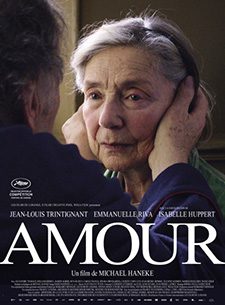 Argo is an engaging espionage thriller about the CIA's successful plot to rescue the 1980 U.S. hostages in Iran by setting up a bogus movie production company to get access to the country. Unfortunately, Argo the movie ultimately becomes as phony as the film within the film with a hair-rising, completely made-up Hollywood bullshit ending where the hostages fly out by the skin of their teeth as the Iranian authorities are literally jumping through plate glass windows in a desperate effort to stop them. It was a fun little piece of fluff that should have been placed in the same file as the Jason Bourne and Jack Reacher movies, yet it somehow gained all the momentum in the awards race especially after director/star Ben Affleck (only slightly less humdrum than usual) failed to be nominated for the Oscar for Best Director, winning the movie extra sympathy points. Argo even won the Screen Actors Guild Award for Best Performance by a Cast despite the fact that the acting is the movie is pretty forgettable except for the usual scene-stealing work by John Goodman as makeup artist/spy John Chambers (a real-life Oscar winner for Planet of the Apes) and Alan Arkin doing his always-enjoyable irascible, cagey elder statesman shtick as a Hollywood producer helping out with the ploy to give it credibility. Argo is an engaging espionage thriller about the CIA's successful plot to rescue the 1980 U.S. hostages in Iran by setting up a bogus movie production company to get access to the country. Unfortunately, Argo the movie ultimately becomes as phony as the film within the film with a hair-rising, completely made-up Hollywood bullshit ending where the hostages fly out by the skin of their teeth as the Iranian authorities are literally jumping through plate glass windows in a desperate effort to stop them. It was a fun little piece of fluff that should have been placed in the same file as the Jason Bourne and Jack Reacher movies, yet it somehow gained all the momentum in the awards race especially after director/star Ben Affleck (only slightly less humdrum than usual) failed to be nominated for the Oscar for Best Director, winning the movie extra sympathy points. Argo even won the Screen Actors Guild Award for Best Performance by a Cast despite the fact that the acting is the movie is pretty forgettable except for the usual scene-stealing work by John Goodman as makeup artist/spy John Chambers (a real-life Oscar winner for Planet of the Apes) and Alan Arkin doing his always-enjoyable irascible, cagey elder statesman shtick as a Hollywood producer helping out with the ploy to give it credibility.
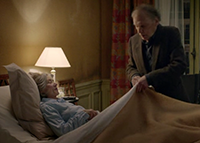 In truth, 2012 was a fairly mediocre year for movies with a lot of really good entries but no exceptional ones. Steven Spielberg's Lincoln featured an awe-inspiring performance by Daniel Day-Lewis in the title role but was otherwise a bit too full of its own self-importance. Life of Pi was the unexpected winner for Best Director (which was predicted to go to Spielberg after the Affleck snub) for Ang Lee's miraculous and spiritually uplifting drama of a man being cast adrift following a passenger liner disaster during which a man-eating tiger became his only companion. Life of Pi might have been the Hindsight Award Best Picture-winner were it not for Amour, Michael Haneke's heartbreaking Austrian drama about an elderly couple whose world is turned upside-down when the wife suffers a stroke. Amour won the Best Foreign Film Award and was nominated for four other Oscars (including Best Picture and Best Actress for 87 year-old Emmanuelle Riva as the wife, the oldest acting nominee in history) and featured an extraordinary unnominated performance by legendary French actor Jean-Louis Trintignant, who came out of a seven year retirement to play the husband. But the Best Picture Oscar has never gone to a foreign language film and the Academy had no intention of breaking that tradition when they could be giving awards to American auteurs like Ben Affleck. In truth, 2012 was a fairly mediocre year for movies with a lot of really good entries but no exceptional ones. Steven Spielberg's Lincoln featured an awe-inspiring performance by Daniel Day-Lewis in the title role but was otherwise a bit too full of its own self-importance. Life of Pi was the unexpected winner for Best Director (which was predicted to go to Spielberg after the Affleck snub) for Ang Lee's miraculous and spiritually uplifting drama of a man being cast adrift following a passenger liner disaster during which a man-eating tiger became his only companion. Life of Pi might have been the Hindsight Award Best Picture-winner were it not for Amour, Michael Haneke's heartbreaking Austrian drama about an elderly couple whose world is turned upside-down when the wife suffers a stroke. Amour won the Best Foreign Film Award and was nominated for four other Oscars (including Best Picture and Best Actress for 87 year-old Emmanuelle Riva as the wife, the oldest acting nominee in history) and featured an extraordinary unnominated performance by legendary French actor Jean-Louis Trintignant, who came out of a seven year retirement to play the husband. But the Best Picture Oscar has never gone to a foreign language film and the Academy had no intention of breaking that tradition when they could be giving awards to American auteurs like Ben Affleck.
|
| Worst Award
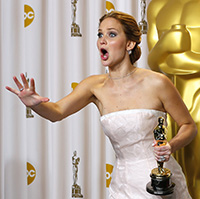 Jennifer Lawrence is a delightful actress who has risen to superstardom through the lucrative Hunger Games and X-Men franchises. But in a typical Hollywood trend, she has received an outrageous amount of critical praise for playing roles that she seems far too young for. This was never more apparent than in the absurdly overrated Silver Linings Playbook, in which the 22 year-old Lawrence plays an embittered widow (the script makes frequent apologies for her youth) who hooks up with 37 year-old recovering mental patient Bradley Cooper (the film was nominated for the Most Egregious Age Difference Between the Leading Man and the Love Interest Award by the Alliance of Women Film Journalists) with the implausible goal of winning a professional dance competition despite Cooper having no dance training or experience. So we have the framework of a million teenage summer rom-coms (with the obligatory When Harry Met Sally "I realized that I really loved you all along" confrontation at the end) which is supposed to have dramatic weight because the two central characters (played by charismatic young - or in Cooper's case, youngish - movie stars) are supposed to have serious mental instability, all of which can be overcome by some rising hormones and a few shimmies on the dance floor. Lawrence is a charming performer and we look forward to when she ages into playing roles that she projects the proper emotional angst for; but Hollywood being what it is, by the time she's matured into those parts they'll be played by up-and-coming 22 year-olds. Jennifer Lawrence is a delightful actress who has risen to superstardom through the lucrative Hunger Games and X-Men franchises. But in a typical Hollywood trend, she has received an outrageous amount of critical praise for playing roles that she seems far too young for. This was never more apparent than in the absurdly overrated Silver Linings Playbook, in which the 22 year-old Lawrence plays an embittered widow (the script makes frequent apologies for her youth) who hooks up with 37 year-old recovering mental patient Bradley Cooper (the film was nominated for the Most Egregious Age Difference Between the Leading Man and the Love Interest Award by the Alliance of Women Film Journalists) with the implausible goal of winning a professional dance competition despite Cooper having no dance training or experience. So we have the framework of a million teenage summer rom-coms (with the obligatory When Harry Met Sally "I realized that I really loved you all along" confrontation at the end) which is supposed to have dramatic weight because the two central characters (played by charismatic young - or in Cooper's case, youngish - movie stars) are supposed to have serious mental instability, all of which can be overcome by some rising hormones and a few shimmies on the dance floor. Lawrence is a charming performer and we look forward to when she ages into playing roles that she projects the proper emotional angst for; but Hollywood being what it is, by the time she's matured into those parts they'll be played by up-and-coming 22 year-olds.
|
Biggest Oversight
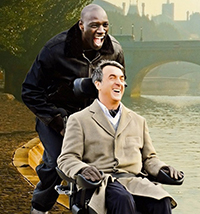 We seriously considered naming Jean-Louis Trintignant's failure to be nominated for Best Actor in this slot but since Amour received five other nominations, we'll focus on another foreign language film that wasn't nominated at all. The Intouchables was a worldwide smash which told the life-affirming story of a a quadriplegic millionaire who experiences a new optimism in the relationship of his life-loving caregiver (magnificent performances by François Cluzet and Omar Sy). The film was submitted to the Academy as France's official entry for the Best Foreign film but its omission raised gasps at the early morning announcement ceremony in favor of markedly inferior entries like A Royal Affair and Kon-Tiki. If you're ever feeling blue and need a lift, we suggest you take in a viewing of The Intouchables. It will make you feel a lot better about life when you do. We seriously considered naming Jean-Louis Trintignant's failure to be nominated for Best Actor in this slot but since Amour received five other nominations, we'll focus on another foreign language film that wasn't nominated at all. The Intouchables was a worldwide smash which told the life-affirming story of a a quadriplegic millionaire who experiences a new optimism in the relationship of his life-loving caregiver (magnificent performances by François Cluzet and Omar Sy). The film was submitted to the Academy as France's official entry for the Best Foreign film but its omission raised gasps at the early morning announcement ceremony in favor of markedly inferior entries like A Royal Affair and Kon-Tiki. If you're ever feeling blue and need a lift, we suggest you take in a viewing of The Intouchables. It will make you feel a lot better about life when you do.
|
Return
to top
1920s •
1930s •
1940s •
1950s •
1960s •
1970s •
1980s • 1990s • 2000s
| |
 |
12 Years a Slave
Actor: Matthew McConaughey (Dallas Buyers Club)
Actress: Cate Blanchett (Blue Jasmine)
Supporting Actor: Jared Leto (Dallas Buyers Club)
Supporting Actress: Lupita Nyong'o (12 Years a Slave)
Director: Alfonso Cuarón
(Gravity) |
12 Years a Slave
Actor: Chiwetel Ejiofor (12 Years a Slave)
Actress: Cate Blanchett (Blue Jasmine)
Supporting Actor: Jared Leto (Dallas Buyers Club)
Supporting Actress: Lupita Nyong'o (12 Years a Slave)
Director: Alfonso Cuarón
(Gravity) |
|
Hindsight Award nominations for 2013
|
| 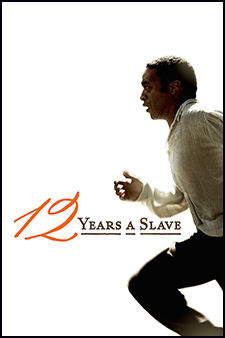 It's a rare thing when we agree with the Academy's choice of Best Picture, but we finally came to a meeting of the minds with 12 Years a Slave, Steve McQueen's compelling depiction of the true story of free black man Solomon Northup's kidnapping and sale into slavery. It was a brilliant turnaround of the well-worn film cliché of presenting the story of an oppressed group from the point of view of a white male. This time, the outsider was a black male who had experienced freedom his entire life only to find himself thrown into the hell of slavery. And hell it was, especially when he was under the rule of sadistic landowner Edwin Epps (a brutal Michael Fassbender). Slavery had long been depicted in films, usually with the slaves presented as happy "darkies" ala Gone with the Wind or with a revisionist view as scheming underlings who were far more clever than the whites who owned them (such as in Django Unchained). Based on Northrup's 1853 memoir, 12 Years a Slave offers no such cop-outs, presenting the slaves with as much opportunity for happiness or misery as the whims of their white owners permitted. It's a rare thing when we agree with the Academy's choice of Best Picture, but we finally came to a meeting of the minds with 12 Years a Slave, Steve McQueen's compelling depiction of the true story of free black man Solomon Northup's kidnapping and sale into slavery. It was a brilliant turnaround of the well-worn film cliché of presenting the story of an oppressed group from the point of view of a white male. This time, the outsider was a black male who had experienced freedom his entire life only to find himself thrown into the hell of slavery. And hell it was, especially when he was under the rule of sadistic landowner Edwin Epps (a brutal Michael Fassbender). Slavery had long been depicted in films, usually with the slaves presented as happy "darkies" ala Gone with the Wind or with a revisionist view as scheming underlings who were far more clever than the whites who owned them (such as in Django Unchained). Based on Northrup's 1853 memoir, 12 Years a Slave offers no such cop-outs, presenting the slaves with as much opportunity for happiness or misery as the whims of their white owners permitted.
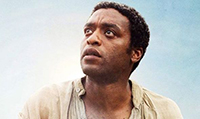 The film is carried on the powerful shoulders of British actor Chiwetel Ejiofor, who infuses Northrup with a dignity and intelligence which never leaves him no matter how oppressive and dehumanizing his surroundings became. Ejiofor was bested in the Best Actor race by Matthew McConaughey, who somehow got past the shallowness of his previous work in How to Lose a Guy in 10 Days, Failure to Launch and Ghosts of Girlfriends Past to deliver a magnificent Oscar-winning performance as a straight man finding himself with AIDS in Dallas Buyers Club. We thought he richly deserved the honor at the time but since this award is about hindsight and since McConaughey went back to embarrassing himself in irritating Lincoln commercials and cinematic junk like Free State of Jones and Gold after his Oscar win, we'll give the Hindsight Award to Ejiofor. Like most reparations, it doesn't come close to making up for past injustices but it's the best we can do. The film is carried on the powerful shoulders of British actor Chiwetel Ejiofor, who infuses Northrup with a dignity and intelligence which never leaves him no matter how oppressive and dehumanizing his surroundings became. Ejiofor was bested in the Best Actor race by Matthew McConaughey, who somehow got past the shallowness of his previous work in How to Lose a Guy in 10 Days, Failure to Launch and Ghosts of Girlfriends Past to deliver a magnificent Oscar-winning performance as a straight man finding himself with AIDS in Dallas Buyers Club. We thought he richly deserved the honor at the time but since this award is about hindsight and since McConaughey went back to embarrassing himself in irritating Lincoln commercials and cinematic junk like Free State of Jones and Gold after his Oscar win, we'll give the Hindsight Award to Ejiofor. Like most reparations, it doesn't come close to making up for past injustices but it's the best we can do.
|
| Worst Award
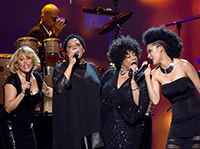 20 Feet from Stardom, Morgan Neville's crowd-pleasing examination of the backup singers who support major recording stars, was the overwhelming favorite to win the Best Feature Length Documentary Oscar and no one said a peep in opposition when it took the award home. But we thought Neville's narrative had all the depth of something you might see on E! Entertainment on any given Saturday afternoon and we don't understand the reverence it received. A far more challenging and thought-provoking nominee was An Act of Killing, Joshua Oppenheimer's harrowing documentary depicting former Indonesian death-squad leaders reenacting their mass murders in whichever cinematic genres they chose. It was a vastly more original and memorable film than the simplistic show biz anecdotes of 20 Feet from Stardom and dealt with a far more important issue. 20 Feet from Stardom, Morgan Neville's crowd-pleasing examination of the backup singers who support major recording stars, was the overwhelming favorite to win the Best Feature Length Documentary Oscar and no one said a peep in opposition when it took the award home. But we thought Neville's narrative had all the depth of something you might see on E! Entertainment on any given Saturday afternoon and we don't understand the reverence it received. A far more challenging and thought-provoking nominee was An Act of Killing, Joshua Oppenheimer's harrowing documentary depicting former Indonesian death-squad leaders reenacting their mass murders in whichever cinematic genres they chose. It was a vastly more original and memorable film than the simplistic show biz anecdotes of 20 Feet from Stardom and dealt with a far more important issue. |
Biggest Oversight
 Robert Redford received a grand total of one Oscar nomination as an actor during his long career, for 1973's Best Picture The Sting. That amount should have been doubled after he won his first-ever New York Film Critics Award for his demanding portrayal of a sailor desperately trying to stay alive as his one-man boat starts slowly sinking in the middle of an empty sea in All is Lost. Without the luxuries of dialogue or any other characters to interact with, Redford shoulders the burden of enacting a harrowing story of one man's struggle for survival in a challenge that is unique in the annals of film acting. And he didn't follow it up with a bunch of cheesy car commercials like Matthew McConaughey. The man has artistic integrity. Robert Redford received a grand total of one Oscar nomination as an actor during his long career, for 1973's Best Picture The Sting. That amount should have been doubled after he won his first-ever New York Film Critics Award for his demanding portrayal of a sailor desperately trying to stay alive as his one-man boat starts slowly sinking in the middle of an empty sea in All is Lost. Without the luxuries of dialogue or any other characters to interact with, Redford shoulders the burden of enacting a harrowing story of one man's struggle for survival in a challenge that is unique in the annals of film acting. And he didn't follow it up with a bunch of cheesy car commercials like Matthew McConaughey. The man has artistic integrity.
|
Return
to top
1920s •
1930s •
1940s •
1950s •
1960s •
1970s •
1980s • 1990s • 2000s
| |
 |
Birdman or (The Unexpected Virtue of Ignorance)
Actor: Eddie Redmayne (The Theory of Everything)
Actress: Julianne Moore (Still Alice)
Supporting Actor: J.K. Simmons
(Whiplash)
Supporting Actress: Patricia Arquette (Boyhood)
Director: Alejandro González Iñárritu Birdman or (The Unexpected Virtue of Ignorance) |
Boyhood
Actor: Timothy Spall (Mr. Turner)*
Actress: Julianne Moore (Still Alice)
Supporting Actor: J.K. Simmons
(Whiplash)
Supporting Actress: Patricia Arquette (Boyhood)
Director: Richard Linklater (Boyhood) |
|
Hindsight Award nominations for 2014
|
| 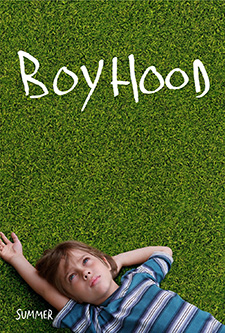 Birdman or (The Unexpected Virtue of Ignorance) was a popular choice for Best Picture; Alejandro González Iñárritu's cleverly told account of a superhero movie star (an ingeniously-cast Michael Keaton) who tries to reinvigorate his career by starring in and directing his own stage adaptation of a novel written by his literary hero. Iñárritu uses every cinematic bell and whistle he can think of to tell his story, but in the end it seems like more of a magic show where the performers put a great deal of energy into diverting the audience into believing that something amazing is going on only to reveal that there was nothing there in the first place. Iñárritu has a typical "movie" conception of Broadway where Keaton's show emerges fully formed on the Great White Way (Keaton's commitment to the project doesn't seem to want to extend to the investment of out-of-town tryouts) and the production wins unexpected critical acclaim after a disastrous set of previews when Keaton shoots his own nose off at the climax of the opening night performance, leaving unanswered the very practical question of how he could continue the run while recuperating in a hospital bed. Birdman is a fun, well-acted and expertly-made movie. But it ain't the best film of 2014. Birdman or (The Unexpected Virtue of Ignorance) was a popular choice for Best Picture; Alejandro González Iñárritu's cleverly told account of a superhero movie star (an ingeniously-cast Michael Keaton) who tries to reinvigorate his career by starring in and directing his own stage adaptation of a novel written by his literary hero. Iñárritu uses every cinematic bell and whistle he can think of to tell his story, but in the end it seems like more of a magic show where the performers put a great deal of energy into diverting the audience into believing that something amazing is going on only to reveal that there was nothing there in the first place. Iñárritu has a typical "movie" conception of Broadway where Keaton's show emerges fully formed on the Great White Way (Keaton's commitment to the project doesn't seem to want to extend to the investment of out-of-town tryouts) and the production wins unexpected critical acclaim after a disastrous set of previews when Keaton shoots his own nose off at the climax of the opening night performance, leaving unanswered the very practical question of how he could continue the run while recuperating in a hospital bed. Birdman is a fun, well-acted and expertly-made movie. But it ain't the best film of 2014.
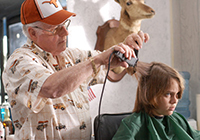 So while the Academy is using its time honoring such pretentious nonsense, we'll give the Hindsight Award to Boyhood, Richard Linklater's 11-year in the making chronicle of a boy's growth into young adulthood. Linklater's journey never strikes a false note in depicting the triumphs, failures, and frequent confrontations with frustrating powerlessness that the road to manhood presents, and his ability to maintain the project for over a decade is one of the landmarks of the history of cinema. Boyhood won the Best Picture Award from the Golden Globes, the BAFTAs, the Los Angeles Film Critics and the New York Film Critics, but Linklater may have been considered too much of a Hollywood outsider for the Academy compared with Birdman's crew of show biz elite. But when it takes you 11 years to make a single movie, I guess it's hard to build up any momentum for your fan base. So while the Academy is using its time honoring such pretentious nonsense, we'll give the Hindsight Award to Boyhood, Richard Linklater's 11-year in the making chronicle of a boy's growth into young adulthood. Linklater's journey never strikes a false note in depicting the triumphs, failures, and frequent confrontations with frustrating powerlessness that the road to manhood presents, and his ability to maintain the project for over a decade is one of the landmarks of the history of cinema. Boyhood won the Best Picture Award from the Golden Globes, the BAFTAs, the Los Angeles Film Critics and the New York Film Critics, but Linklater may have been considered too much of a Hollywood outsider for the Academy compared with Birdman's crew of show biz elite. But when it takes you 11 years to make a single movie, I guess it's hard to build up any momentum for your fan base.
|
| Worst Award
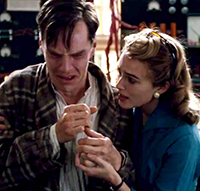 The Imitation Game gave the story of computer pioneer Alan Turing's cracking of the Nazi "Enigma" code the Hollywood treatment, depicting the ahead-of-his-time genius as an antisocial egg head along the lines of Sheldon Cooper from The Big Bang Theory and hiding his homosexuality from a disapproving public by making a beard of his one female colleague, who as luck would have it is smokin' hot Keira Knightley. The story was told on stage and screen with much more success - and fewer compromises to Hollywood's way of storytelling - in Breaking the Code, with Derek Jacobi as Turing. Screenwriter Graham Moore took shocking liberties with the facts for his script of The Imitation Game (inventing, for instance, the completely fictionalized episode where one of the scientists just happens to have a brother on a ship that they learn is going to be blown up in one of the first Enigma transmissions they translate), winning the Oscar for Best Adapted Screenplay. Maybe if they'd made Turing a heterosexual badass played by Hugh Jackman, they would have won Best Picture. The Imitation Game gave the story of computer pioneer Alan Turing's cracking of the Nazi "Enigma" code the Hollywood treatment, depicting the ahead-of-his-time genius as an antisocial egg head along the lines of Sheldon Cooper from The Big Bang Theory and hiding his homosexuality from a disapproving public by making a beard of his one female colleague, who as luck would have it is smokin' hot Keira Knightley. The story was told on stage and screen with much more success - and fewer compromises to Hollywood's way of storytelling - in Breaking the Code, with Derek Jacobi as Turing. Screenwriter Graham Moore took shocking liberties with the facts for his script of The Imitation Game (inventing, for instance, the completely fictionalized episode where one of the scientists just happens to have a brother on a ship that they learn is going to be blown up in one of the first Enigma transmissions they translate), winning the Oscar for Best Adapted Screenplay. Maybe if they'd made Turing a heterosexual badass played by Hugh Jackman, they would have won Best Picture. |
Biggest Oversight
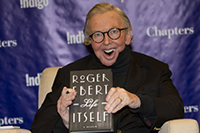 Life Itself, Steve James' heartrending documentary about the life of legendary critic Roger Ebert and his subsequent struggle with throat cancer that forced him to lose his lower jaw was on the shortlist of the finest films of any kind in 2014. We seriously considered making it our overall Best Picture but the Academy inexplicably couldn't even find a slot for it as one of its five nominees for Best Documentary after it won the award from the National Board of Review and a host of critics' associations. The Academy's winner was the sure thing Citizenfour, Laura Poitras' fly-on-the-wall chronicle of Edward Snowden's secret meeting with reporters to disclose US government spy tactics on its own citizens. The other nominees, Finding Vivian Maier, Last Days in Vietnam, The Salt of the Earth and Virunga were all otherwise perfectly acceptable entries which did not contain anything like the emotional resonance of Life Itself. This was a year when the Documentary branch of the Academy gets a disapproving thumbs down. Life Itself, Steve James' heartrending documentary about the life of legendary critic Roger Ebert and his subsequent struggle with throat cancer that forced him to lose his lower jaw was on the shortlist of the finest films of any kind in 2014. We seriously considered making it our overall Best Picture but the Academy inexplicably couldn't even find a slot for it as one of its five nominees for Best Documentary after it won the award from the National Board of Review and a host of critics' associations. The Academy's winner was the sure thing Citizenfour, Laura Poitras' fly-on-the-wall chronicle of Edward Snowden's secret meeting with reporters to disclose US government spy tactics on its own citizens. The other nominees, Finding Vivian Maier, Last Days in Vietnam, The Salt of the Earth and Virunga were all otherwise perfectly acceptable entries which did not contain anything like the emotional resonance of Life Itself. This was a year when the Documentary branch of the Academy gets a disapproving thumbs down. |
Return
to top
1920s •
1930s •
1940s •
1950s •
1960s •
1970s •
1980s • 1990s • 2000s
| |
 |
Spotlight
Actor: Leonardo DiCaprio (The Revenant)
Actress: Brie Larson (Room)
Supporting Actor: Mark Rylance (Bridge of Spies)
Supporting Actress: Alicia Vikander
(The Danish Girl)
Director: Alejandro González Iñárritu (The Revenant) |
The Big Short
Actor: Leonardo DiCaprio (The Revenant)
Actress: Brie Larson (Room)
Supporting Actor: Steve Carell (The Big Short)*
Supporting Actress: Alicia Vikander
(Ex Machina)*
Director: Alejandro González Iñárritu (The Revenant) |
|
Hindsight Award nominations for 2015
|
| 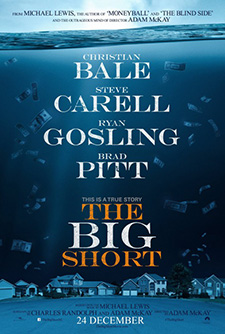 The
Academy didn't seem to have a lot of enthusiasm for its Best Picture selection this year. Spotlight, Tom McCarthy's depiction of the Boston Globe's uncovering of a child molestation cover-up by the Catholic Church won only a single other Oscar for Best Adapted Screenplay along with its Best Picture statuette. The Academy spread the wealth around in 2015, awarding three Oscars to The Revenant (including Best Actor to Leonardo DiCaprio and Best Director to last year's winner Alejandro González Iñárritu) and five to Mad Max: Fury Road, George Miller's big budget reboot of his Road Warrior series. We actually don't have any strong objections to the selection of Spotlight, a powerfully made, gripping account of the Globe's Pulitzer prize-winning efforts to uncover the truth, finely acted by New York Film Critics Best Actor Michael Keaton and Best Supporting Actor nominee Mark Ruffalo (although giving a Best Supporting Actress nomination to Rachel McAdams for her far less impactful role seemed to be a case of rounding out the field). In a year like 2015, calling Spotlight the best picture of the year doesn't keep us awake at night. The
Academy didn't seem to have a lot of enthusiasm for its Best Picture selection this year. Spotlight, Tom McCarthy's depiction of the Boston Globe's uncovering of a child molestation cover-up by the Catholic Church won only a single other Oscar for Best Adapted Screenplay along with its Best Picture statuette. The Academy spread the wealth around in 2015, awarding three Oscars to The Revenant (including Best Actor to Leonardo DiCaprio and Best Director to last year's winner Alejandro González Iñárritu) and five to Mad Max: Fury Road, George Miller's big budget reboot of his Road Warrior series. We actually don't have any strong objections to the selection of Spotlight, a powerfully made, gripping account of the Globe's Pulitzer prize-winning efforts to uncover the truth, finely acted by New York Film Critics Best Actor Michael Keaton and Best Supporting Actor nominee Mark Ruffalo (although giving a Best Supporting Actress nomination to Rachel McAdams for her far less impactful role seemed to be a case of rounding out the field). In a year like 2015, calling Spotlight the best picture of the year doesn't keep us awake at night.
 But it's our job to be contrarian and if the Academy wanted to give their Best Picture award to a movie which had only won a screenplay award as its other honor, they would have done better to name The Big Short, which took home the Original Screenplay Oscar as well as the top honor from the Producers Guild of America (a common precursor to the Best Picture Oscar in recent years). It's a brilliantly inventive observation of the real estate collapse of the mid-2000s that is both madly entertaining and informative (communicating the complexities of the financial crash, for instance, through the simple expedient of having them explained by Margot Robbie in a bubble bath). The Big Short was filled with madly entertaining performances by Oscar nominee Christian Bale, Ryan Gosling, Brad Pitt and especially Steve Carell, who would have been our pick to take the film's Supporting Actor slot if anyone had bothered to ask.
If you still prefer Spotlight, we certainly understand your point and agree with you that it's a fine film. The only thing it's lacking is a scene of Margot Robbie in a bubble bath. But it's our job to be contrarian and if the Academy wanted to give their Best Picture award to a movie which had only won a screenplay award as its other honor, they would have done better to name The Big Short, which took home the Original Screenplay Oscar as well as the top honor from the Producers Guild of America (a common precursor to the Best Picture Oscar in recent years). It's a brilliantly inventive observation of the real estate collapse of the mid-2000s that is both madly entertaining and informative (communicating the complexities of the financial crash, for instance, through the simple expedient of having them explained by Margot Robbie in a bubble bath). The Big Short was filled with madly entertaining performances by Oscar nominee Christian Bale, Ryan Gosling, Brad Pitt and especially Steve Carell, who would have been our pick to take the film's Supporting Actor slot if anyone had bothered to ask.
If you still prefer Spotlight, we certainly understand your point and agree with you that it's a fine film. The only thing it's lacking is a scene of Margot Robbie in a bubble bath.
|
| Worst Award
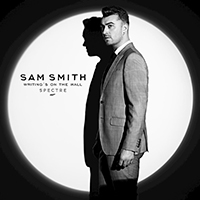 We love the theme songs from James Bond movies even more than the movies themselves, and so does the Academy. Bond films have been on a roll with nominations for Best Song for "Live and Let Die," "Nobody Does It Better," "For Your Eyes Only," and "View to a Kill" after being shockingly overlooked for it's earlier entries "Goldfinger," "Diamond Are Forever," "You Only Live Twice" and "Thunderball." The Bond franchise finally won the Best Song Oscar in 2012 for Adele's "Skyfall," which we have no problem with, even if it wasn't the best Bond theme song by a longshot (we love Adele, but she's no Shirley Bassey).
The Academy seemed to realize that they were selling Bond short in the music department because they turned around and gave another Oscar to the next Bond theme song, "Writing's on the Wall" from Spectre. A more than respectable entry in the Bond canon but not having anything like the emotional resonance of Dianne Warren and Lady Gaga's "Til It Happens to You" from the documentary The Hunting Ground. Both the film and the song are powerful statements about sexual violence against women and while we like "Writing's on the Wall," there's simply no comparison about which is the better selection for the Oscar. But I guess when they're dealing with somebody who has a license to kill, it's hard for the Academy to say no. We love the theme songs from James Bond movies even more than the movies themselves, and so does the Academy. Bond films have been on a roll with nominations for Best Song for "Live and Let Die," "Nobody Does It Better," "For Your Eyes Only," and "View to a Kill" after being shockingly overlooked for it's earlier entries "Goldfinger," "Diamond Are Forever," "You Only Live Twice" and "Thunderball." The Bond franchise finally won the Best Song Oscar in 2012 for Adele's "Skyfall," which we have no problem with, even if it wasn't the best Bond theme song by a longshot (we love Adele, but she's no Shirley Bassey).
The Academy seemed to realize that they were selling Bond short in the music department because they turned around and gave another Oscar to the next Bond theme song, "Writing's on the Wall" from Spectre. A more than respectable entry in the Bond canon but not having anything like the emotional resonance of Dianne Warren and Lady Gaga's "Til It Happens to You" from the documentary The Hunting Ground. Both the film and the song are powerful statements about sexual violence against women and while we like "Writing's on the Wall," there's simply no comparison about which is the better selection for the Oscar. But I guess when they're dealing with somebody who has a license to kill, it's hard for the Academy to say no. |
Biggest Oversight
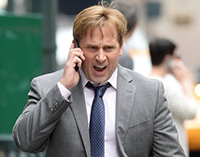 The
five nominees for Best Supporting Actor in 2015 were Christian Bale in The Big Short, Tom Hardy in The Revenant, Mark Ruffalo in Spotlight, Sylvester Stallone in Creed, and winner Mark Rylance in Bridge of Spies. Many pundits predicted that the award would go to Stallone for his Golden Globe-winning performance as a cancer-ridden Rocky Balboa who somehow manages to train the bastard son of his former rival Apollo Creed to a championship fight while undergoing chemotherapy for his not-quite-fatal disease (in case he's needed for a sequel). We swear that we didn't notice any underlying subtleties that made Stallone's performance in Creed any different from his outings in Rocky II or Rocky IV or Rocky Balboa, although it was undeniably fun to see him in the Oscar race for a change after decades of piling up Golden Raspberry Awards. Still, Stallone (and Hardy) took up a slot that was far more deserving for Jacob Tremblay, who gave one of the most remarkable performances by a child actor in film history in Room, and especially Steve Carell for his manic turn as Madison Avenue outsider and ticking time bomb Mark Baum in The Big Short. Carell may never be able to get completely out of the shadow of his character Michael Scott from the phenomenally successful sitcom The Office but he has evolved into a superb actor in recent years, winning a deserved Oscar nomination for Firestarter and delivering a masterful turn in The Big Short. But to actually win an Oscar, he may need to make a movie where Michael Scott undergoes chemotherapy. The
five nominees for Best Supporting Actor in 2015 were Christian Bale in The Big Short, Tom Hardy in The Revenant, Mark Ruffalo in Spotlight, Sylvester Stallone in Creed, and winner Mark Rylance in Bridge of Spies. Many pundits predicted that the award would go to Stallone for his Golden Globe-winning performance as a cancer-ridden Rocky Balboa who somehow manages to train the bastard son of his former rival Apollo Creed to a championship fight while undergoing chemotherapy for his not-quite-fatal disease (in case he's needed for a sequel). We swear that we didn't notice any underlying subtleties that made Stallone's performance in Creed any different from his outings in Rocky II or Rocky IV or Rocky Balboa, although it was undeniably fun to see him in the Oscar race for a change after decades of piling up Golden Raspberry Awards. Still, Stallone (and Hardy) took up a slot that was far more deserving for Jacob Tremblay, who gave one of the most remarkable performances by a child actor in film history in Room, and especially Steve Carell for his manic turn as Madison Avenue outsider and ticking time bomb Mark Baum in The Big Short. Carell may never be able to get completely out of the shadow of his character Michael Scott from the phenomenally successful sitcom The Office but he has evolved into a superb actor in recent years, winning a deserved Oscar nomination for Firestarter and delivering a masterful turn in The Big Short. But to actually win an Oscar, he may need to make a movie where Michael Scott undergoes chemotherapy.
|
Return
to top
1920s •
1930s •
1940s •
1950s •
1960s •
1970s •
1980s • 1990s • 2000s
|
|


 The King's Speech is
a moving, superbly-made drama about England's George V's struggles with a debilitating speech impediment, having the crown thrust unexpectedly on his head after the abdication of his brother, and the oncoming threat of the Nazis; all with the help of his quirky yet compassionate speech therapist. It features superb performances by Geoffrey Rush at the therapist, Helena Bonham Carter as the queen, Derek Jacobi as Archbishop Cosmo Lang, and a magnificent tour de force by Colin Firth as the king. It is a wonderful addition to the Oscar pantheon, but is is the most deserving? The ultimate answer is a tenuous "no," because while there isn't a lot to criticize about The King's Speech, a word that its impressive production and tasteful execution can't escape is "conventional". There is no question that in a lot of years, The King's Speech would have been our runaway winner for Best Picture, but 2010 happened to be a year where a a handful of films were equally moving and entertaining but rose the bar by challenging their audience in a way that The King's Speech's well-structured formalism couldn't compete with.
The King's Speech is
a moving, superbly-made drama about England's George V's struggles with a debilitating speech impediment, having the crown thrust unexpectedly on his head after the abdication of his brother, and the oncoming threat of the Nazis; all with the help of his quirky yet compassionate speech therapist. It features superb performances by Geoffrey Rush at the therapist, Helena Bonham Carter as the queen, Derek Jacobi as Archbishop Cosmo Lang, and a magnificent tour de force by Colin Firth as the king. It is a wonderful addition to the Oscar pantheon, but is is the most deserving? The ultimate answer is a tenuous "no," because while there isn't a lot to criticize about The King's Speech, a word that its impressive production and tasteful execution can't escape is "conventional". There is no question that in a lot of years, The King's Speech would have been our runaway winner for Best Picture, but 2010 happened to be a year where a a handful of films were equally moving and entertaining but rose the bar by challenging their audience in a way that The King's Speech's well-structured formalism couldn't compete with. The most challenging of these is director David Fincher and screenwriter Aaron Sorkin's marvelously original account of the rise of Facebook mastermind Mark Zuckerberg, The Social Network. The film depicts Facebook's founding fathers Zuckerberg, Eduardo Saverin and Sean Parker (a superbly-cast Jesse Eisenberg, Andrew Garfield and Justin Timberlake) as self-obsessed, opportunistic swine who manage to change the foundation of how human interaction works while suing each other and being sued by pretenders to the throne like entitled, billionaire identical twins (another masterful performance by Armie Hammer) who Zuckerberg met briefly in college and feel that as a result, they should own his achievements; all while employing a mind-bending chronology that results in a Rashomon-like display that keeps the viewer guessing as to who is telling the truth and who is embellishing it like a Facebook status about your family vacation. Through some alchemy, Fincher and Sorkin managed to present these loathsome characters as not only compelling, but ultimately even touching and likable. The Social Network was named Best Picture by both the Los Angeles and New York Film Critics Association but when it came time to hand out the Oscars, the momentum had inevitably swung to the superbly made (if far less demanding) The King's Speech. It was a nice, safe choice that Academy members could compliment each other for their impeccable taste on their Facebook feeds the next morning.
The most challenging of these is director David Fincher and screenwriter Aaron Sorkin's marvelously original account of the rise of Facebook mastermind Mark Zuckerberg, The Social Network. The film depicts Facebook's founding fathers Zuckerberg, Eduardo Saverin and Sean Parker (a superbly-cast Jesse Eisenberg, Andrew Garfield and Justin Timberlake) as self-obsessed, opportunistic swine who manage to change the foundation of how human interaction works while suing each other and being sued by pretenders to the throne like entitled, billionaire identical twins (another masterful performance by Armie Hammer) who Zuckerberg met briefly in college and feel that as a result, they should own his achievements; all while employing a mind-bending chronology that results in a Rashomon-like display that keeps the viewer guessing as to who is telling the truth and who is embellishing it like a Facebook status about your family vacation. Through some alchemy, Fincher and Sorkin managed to present these loathsome characters as not only compelling, but ultimately even touching and likable. The Social Network was named Best Picture by both the Los Angeles and New York Film Critics Association but when it came time to hand out the Oscars, the momentum had inevitably swung to the superbly made (if far less demanding) The King's Speech. It was a nice, safe choice that Academy members could compliment each other for their impeccable taste on their Facebook feeds the next morning. The
Oscar for Live Action Short is frequently criticized as being obsolete and showcasing nothing more than cheaply-made student films. This has been rarely more the case than with the selection of Luke Matheny's thesis project at NYU film school, God of Love, an eighteen minute sitcom about a darts player who becomes Cupid when when he comes across a magic box of darts. The Academy gives out Student Academy Awards to encourage this kind of effort (which God of Love also won) but Matheny's was the weakest and most trivial of any of the nominees that year. The Oscar probably should have gone to Na Wewe, a hair-raising account of the civil war in Burundi. But the Academy was only interested in making safe choices in 2010, and God of Love was about as dangerous as an old episode of Love, American Style.
The
Oscar for Live Action Short is frequently criticized as being obsolete and showcasing nothing more than cheaply-made student films. This has been rarely more the case than with the selection of Luke Matheny's thesis project at NYU film school, God of Love, an eighteen minute sitcom about a darts player who becomes Cupid when when he comes across a magic box of darts. The Academy gives out Student Academy Awards to encourage this kind of effort (which God of Love also won) but Matheny's was the weakest and most trivial of any of the nominees that year. The Oscar probably should have gone to Na Wewe, a hair-raising account of the civil war in Burundi. But the Academy was only interested in making safe choices in 2010, and God of Love was about as dangerous as an old episode of Love, American Style. Lesley Manville won the Best Actress award from the National Board of Review for her stellar performance as a neurotic woman looking for love in all the wrong places in Mike Leigh's Another Year, an actress and a film that were too obscure to catch the Academy's attention when superstars like Natalie Portman, Annetter Bening and Nicole Kidman and up-and-coming ingénues like Michelle Williams and Jennifer Lawrence were available to honor. We're not really criticizing Oscar's Final Five because they all gave impressive performances but none had more complexity than Manville's unforgettable depiction of an old friend of a compassionate family who becomes so needy and destructive that she tears the relationship apart. Manville isn't the household name that Natalie Portman or Jennifer Lawrence are but anyone who saw her work in Another Year will never forget her. It's a shame that those numbers weren't quite at a level to win the Academy's attention.
Lesley Manville won the Best Actress award from the National Board of Review for her stellar performance as a neurotic woman looking for love in all the wrong places in Mike Leigh's Another Year, an actress and a film that were too obscure to catch the Academy's attention when superstars like Natalie Portman, Annetter Bening and Nicole Kidman and up-and-coming ingénues like Michelle Williams and Jennifer Lawrence were available to honor. We're not really criticizing Oscar's Final Five because they all gave impressive performances but none had more complexity than Manville's unforgettable depiction of an old friend of a compassionate family who becomes so needy and destructive that she tears the relationship apart. Manville isn't the household name that Natalie Portman or Jennifer Lawrence are but anyone who saw her work in Another Year will never forget her. It's a shame that those numbers weren't quite at a level to win the Academy's attention.
 It's hard to fault the Academy for their selection of The Artist as Best Picture after accusing them of cowardice the previous year. The Artist was, after all, an incredibly risky endeavor of a full-fledged silent movie shot in the look and style of films of the 1920's (unlike Mel Brooks' 1976 novelty Silent Movie) and we have to admire a movie whose likes hadn't been seen in over 80 years. But to judge the true quality of The Artist, we shouldn't compare it to contemporary fare like Hugo or The Descendants, but rather to films of the late silent era that The Artist is an homage to. And compared with late-era silent classics like Sunrise, The Cameraman and The Gold Rush, The Artist simply ceases to exist. Its story centers around a popular star in silent films (Jean Dujardin giving a laudable impression of Douglas Fairbanks, Sr.) who refuses to compromise his "art" with the advent of sound until his life is brought to the abyss of despair only to be rescued by his impossibly cute dog and a young actress he discovered and fell in love with when he was on top who became a superstar in early talkies. If all this sounds familiar, it's because the story is an uncredited remake of the Fredric March/Janet Gaynor version of A Star is Born, which was a retread of previously used material in 1937 and has been remade so many times that one gets sleepy-eyed trying to count its spin-offs. And ironically, Dujardin's "artistry" is nothing more than hack work, since even the films the character makes at the height of his fame are pandering nonsense aimed at popular box office success (the dog performs tricks for the audience when Dujardin is at the top of his profession; you never saw that kind of crap from Maria Falconetti). So while we admire the makers of The Artist's courage in taking the risk of bringing back the silent movie genre for one big-budget final breath, we aren't inclined to give the Best Picture award to a gimmick.
It's hard to fault the Academy for their selection of The Artist as Best Picture after accusing them of cowardice the previous year. The Artist was, after all, an incredibly risky endeavor of a full-fledged silent movie shot in the look and style of films of the 1920's (unlike Mel Brooks' 1976 novelty Silent Movie) and we have to admire a movie whose likes hadn't been seen in over 80 years. But to judge the true quality of The Artist, we shouldn't compare it to contemporary fare like Hugo or The Descendants, but rather to films of the late silent era that The Artist is an homage to. And compared with late-era silent classics like Sunrise, The Cameraman and The Gold Rush, The Artist simply ceases to exist. Its story centers around a popular star in silent films (Jean Dujardin giving a laudable impression of Douglas Fairbanks, Sr.) who refuses to compromise his "art" with the advent of sound until his life is brought to the abyss of despair only to be rescued by his impossibly cute dog and a young actress he discovered and fell in love with when he was on top who became a superstar in early talkies. If all this sounds familiar, it's because the story is an uncredited remake of the Fredric March/Janet Gaynor version of A Star is Born, which was a retread of previously used material in 1937 and has been remade so many times that one gets sleepy-eyed trying to count its spin-offs. And ironically, Dujardin's "artistry" is nothing more than hack work, since even the films the character makes at the height of his fame are pandering nonsense aimed at popular box office success (the dog performs tricks for the audience when Dujardin is at the top of his profession; you never saw that kind of crap from Maria Falconetti). So while we admire the makers of The Artist's courage in taking the risk of bringing back the silent movie genre for one big-budget final breath, we aren't inclined to give the Best Picture award to a gimmick. The real race comes down to the fore-mentioned Hugo and The Descendants. While we love Alexander Payne's tender drama of the executor of a massive piece of undeveloped coastland in Hawaii (the finest performance of George Clooney's career) who learns that the proposed developer of the estate had an affair with his wife before the accident that put her in a coma, the award goes by the wink of an eyelash to Hugo. Martin Scorsese's 3-D extravaganza of an orphaned boy who hides in the massive clockworks of a London train station while he tries to complete the project he and his late father had worked obsessively on for years contained vestigial clichés from a million other stories about plucky orphans, but infused with so much of Scorsese's mastery of filmmaking that the narrative was taken to a higher level than movies devoted to similar subjects. And when the hero of the tale turns out to be none other than silent film pioneer Georges Méliès, Hugo becomes even more of a tribute to the Golden Age of silent filmmaking than The Artist. And Méliès didn't even have a cute dog to distract us with.
The real race comes down to the fore-mentioned Hugo and The Descendants. While we love Alexander Payne's tender drama of the executor of a massive piece of undeveloped coastland in Hawaii (the finest performance of George Clooney's career) who learns that the proposed developer of the estate had an affair with his wife before the accident that put her in a coma, the award goes by the wink of an eyelash to Hugo. Martin Scorsese's 3-D extravaganza of an orphaned boy who hides in the massive clockworks of a London train station while he tries to complete the project he and his late father had worked obsessively on for years contained vestigial clichés from a million other stories about plucky orphans, but infused with so much of Scorsese's mastery of filmmaking that the narrative was taken to a higher level than movies devoted to similar subjects. And when the hero of the tale turns out to be none other than silent film pioneer Georges Méliès, Hugo becomes even more of a tribute to the Golden Age of silent filmmaking than The Artist. And Méliès didn't even have a cute dog to distract us with. While we don't agree with a lot of Oscar's choices this year, we aren't thrown into a tizzy by them, either. We've already discussed our feelings about The Artist as Best Picture but at the same time, we get it. We would have honored Rooney Mara for her astonishing turn in The Girl with the Dragon Tattoo for Best Actress but on the other hand, if the Academy chose to give Meryl Streep the award every year, we could see the logic in that. So we'll focus on one of our pet peeves and zero in on the Costuming award for Mark Bridges of The Artist. It's not a bad choice; in fact, it's one we agreed with at the time. But having had a few years to chew on it, we're not really convinced that the film's standard issue 1920s tuxedos and flapper-wear were such extraordinary achievements. As we said above, if The Artist was released in a year when silent movies were actually the rage, its costuming wouldn't make any impact at all. But because the producers had the good sense to wait 80 years, Bridges got to take home an Oscar and that just doesn't seem right. The other nominees were, as usual, richly dressed period pieces and the winner among them probably should have been Michael O’Connor for Jane Eyre. But since we're always championing contemporary films for the category, the Hindsight Award goes to Trish Summerville for The Girl with the Dragon Tattoo. Lucky for her, Meryl Streep wasn't eligible.
While we don't agree with a lot of Oscar's choices this year, we aren't thrown into a tizzy by them, either. We've already discussed our feelings about The Artist as Best Picture but at the same time, we get it. We would have honored Rooney Mara for her astonishing turn in The Girl with the Dragon Tattoo for Best Actress but on the other hand, if the Academy chose to give Meryl Streep the award every year, we could see the logic in that. So we'll focus on one of our pet peeves and zero in on the Costuming award for Mark Bridges of The Artist. It's not a bad choice; in fact, it's one we agreed with at the time. But having had a few years to chew on it, we're not really convinced that the film's standard issue 1920s tuxedos and flapper-wear were such extraordinary achievements. As we said above, if The Artist was released in a year when silent movies were actually the rage, its costuming wouldn't make any impact at all. But because the producers had the good sense to wait 80 years, Bridges got to take home an Oscar and that just doesn't seem right. The other nominees were, as usual, richly dressed period pieces and the winner among them probably should have been Michael O’Connor for Jane Eyre. But since we're always championing contemporary films for the category, the Hindsight Award goes to Trish Summerville for The Girl with the Dragon Tattoo. Lucky for her, Meryl Streep wasn't eligible. Coriolanus was one of Shakespeare's tragedies which had never been made as a full-length theatrical film until Ralph Fiennes became obsessed with the idea of directing and starring in it. Fiennes wasn't able to get financial backing for his dream project until hunky heartthrob Gerard Butler agreed to take on the secondary role of Tullus Aufidius, enabling Fiennes to put together one of the greatest Shakespearean films ever assembled. It's a mystery that this brilliantly made version of a neglected classic failed to make more impact than it did or that its star didn't win (or was even nominated for) a single major award for his magnificent performance, with the Oscars choosing instead to honor drab work by Brad Pitt in Moneyball and Gary Oldman in Tinker Tailor Soldier Spy. We don't know if Fiennes' Coriolanus will ever find the audience it deserves but in the Hindsight Awards race, it will always be a winner.
Coriolanus was one of Shakespeare's tragedies which had never been made as a full-length theatrical film until Ralph Fiennes became obsessed with the idea of directing and starring in it. Fiennes wasn't able to get financial backing for his dream project until hunky heartthrob Gerard Butler agreed to take on the secondary role of Tullus Aufidius, enabling Fiennes to put together one of the greatest Shakespearean films ever assembled. It's a mystery that this brilliantly made version of a neglected classic failed to make more impact than it did or that its star didn't win (or was even nominated for) a single major award for his magnificent performance, with the Oscars choosing instead to honor drab work by Brad Pitt in Moneyball and Gary Oldman in Tinker Tailor Soldier Spy. We don't know if Fiennes' Coriolanus will ever find the audience it deserves but in the Hindsight Awards race, it will always be a winner. Argo is an engaging espionage thriller about the CIA's successful plot to rescue the 1980 U.S. hostages in Iran by setting up a bogus movie production company to get access to the country. Unfortunately, Argo the movie ultimately becomes as phony as the film within the film with a hair-rising, completely made-up Hollywood bullshit ending where the hostages fly out by the skin of their teeth as the Iranian authorities are literally jumping through plate glass windows in a desperate effort to stop them. It was a fun little piece of fluff that should have been placed in the same file as the Jason Bourne and Jack Reacher movies, yet it somehow gained all the momentum in the awards race especially after director/star Ben Affleck (only slightly less humdrum than usual) failed to be nominated for the Oscar for Best Director, winning the movie extra sympathy points. Argo even won the Screen Actors Guild Award for Best Performance by a Cast despite the fact that the acting is the movie is pretty forgettable except for the usual scene-stealing work by John Goodman as makeup artist/spy John Chambers (a real-life Oscar winner for Planet of the Apes) and Alan Arkin doing his always-enjoyable irascible, cagey elder statesman shtick as a Hollywood producer helping out with the ploy to give it credibility.
Argo is an engaging espionage thriller about the CIA's successful plot to rescue the 1980 U.S. hostages in Iran by setting up a bogus movie production company to get access to the country. Unfortunately, Argo the movie ultimately becomes as phony as the film within the film with a hair-rising, completely made-up Hollywood bullshit ending where the hostages fly out by the skin of their teeth as the Iranian authorities are literally jumping through plate glass windows in a desperate effort to stop them. It was a fun little piece of fluff that should have been placed in the same file as the Jason Bourne and Jack Reacher movies, yet it somehow gained all the momentum in the awards race especially after director/star Ben Affleck (only slightly less humdrum than usual) failed to be nominated for the Oscar for Best Director, winning the movie extra sympathy points. Argo even won the Screen Actors Guild Award for Best Performance by a Cast despite the fact that the acting is the movie is pretty forgettable except for the usual scene-stealing work by John Goodman as makeup artist/spy John Chambers (a real-life Oscar winner for Planet of the Apes) and Alan Arkin doing his always-enjoyable irascible, cagey elder statesman shtick as a Hollywood producer helping out with the ploy to give it credibility. In truth, 2012 was a fairly mediocre year for movies with a lot of really good entries but no exceptional ones. Steven Spielberg's Lincoln featured an awe-inspiring performance by Daniel Day-Lewis in the title role but was otherwise a bit too full of its own self-importance. Life of Pi was the unexpected winner for Best Director (which was predicted to go to Spielberg after the Affleck snub) for Ang Lee's miraculous and spiritually uplifting drama of a man being cast adrift following a passenger liner disaster during which a man-eating tiger became his only companion. Life of Pi might have been the Hindsight Award Best Picture-winner were it not for Amour, Michael Haneke's heartbreaking Austrian drama about an elderly couple whose world is turned upside-down when the wife suffers a stroke. Amour won the Best Foreign Film Award and was nominated for four other Oscars (including Best Picture and Best Actress for 87 year-old Emmanuelle Riva as the wife, the oldest acting nominee in history) and featured an extraordinary unnominated performance by legendary French actor Jean-Louis Trintignant, who came out of a seven year retirement to play the husband. But the Best Picture Oscar has never gone to a foreign language film and the Academy had no intention of breaking that tradition when they could be giving awards to American auteurs like Ben Affleck.
In truth, 2012 was a fairly mediocre year for movies with a lot of really good entries but no exceptional ones. Steven Spielberg's Lincoln featured an awe-inspiring performance by Daniel Day-Lewis in the title role but was otherwise a bit too full of its own self-importance. Life of Pi was the unexpected winner for Best Director (which was predicted to go to Spielberg after the Affleck snub) for Ang Lee's miraculous and spiritually uplifting drama of a man being cast adrift following a passenger liner disaster during which a man-eating tiger became his only companion. Life of Pi might have been the Hindsight Award Best Picture-winner were it not for Amour, Michael Haneke's heartbreaking Austrian drama about an elderly couple whose world is turned upside-down when the wife suffers a stroke. Amour won the Best Foreign Film Award and was nominated for four other Oscars (including Best Picture and Best Actress for 87 year-old Emmanuelle Riva as the wife, the oldest acting nominee in history) and featured an extraordinary unnominated performance by legendary French actor Jean-Louis Trintignant, who came out of a seven year retirement to play the husband. But the Best Picture Oscar has never gone to a foreign language film and the Academy had no intention of breaking that tradition when they could be giving awards to American auteurs like Ben Affleck. We seriously considered naming Jean-Louis Trintignant's failure to be nominated for Best Actor in this slot but since Amour received five other nominations, we'll focus on another foreign language film that wasn't nominated at all. The Intouchables was a worldwide smash which told the life-affirming story of a a quadriplegic millionaire who experiences a new optimism in the relationship of his life-loving caregiver (magnificent performances by François Cluzet and Omar Sy). The film was submitted to the Academy as France's official entry for the Best Foreign film but its omission raised gasps at the early morning announcement ceremony in favor of markedly inferior entries like A Royal Affair and Kon-Tiki. If you're ever feeling blue and need a lift, we suggest you take in a viewing of The Intouchables. It will make you feel a lot better about life when you do.
We seriously considered naming Jean-Louis Trintignant's failure to be nominated for Best Actor in this slot but since Amour received five other nominations, we'll focus on another foreign language film that wasn't nominated at all. The Intouchables was a worldwide smash which told the life-affirming story of a a quadriplegic millionaire who experiences a new optimism in the relationship of his life-loving caregiver (magnificent performances by François Cluzet and Omar Sy). The film was submitted to the Academy as France's official entry for the Best Foreign film but its omission raised gasps at the early morning announcement ceremony in favor of markedly inferior entries like A Royal Affair and Kon-Tiki. If you're ever feeling blue and need a lift, we suggest you take in a viewing of The Intouchables. It will make you feel a lot better about life when you do. It's a rare thing when we agree with the Academy's choice of Best Picture, but we finally came to a meeting of the minds with 12 Years a Slave, Steve McQueen's compelling depiction of the true story of free black man Solomon Northup's kidnapping and sale into slavery. It was a brilliant turnaround of the well-worn film cliché of presenting the story of an oppressed group from the point of view of a white male. This time, the outsider was a black male who had experienced freedom his entire life only to find himself thrown into the hell of slavery. And hell it was, especially when he was under the rule of sadistic landowner Edwin Epps (a brutal Michael Fassbender). Slavery had long been depicted in films, usually with the slaves presented as happy "darkies" ala Gone with the Wind or with a revisionist view as scheming underlings who were far more clever than the whites who owned them (such as in Django Unchained). Based on Northrup's 1853 memoir, 12 Years a Slave offers no such cop-outs, presenting the slaves with as much opportunity for happiness or misery as the whims of their white owners permitted.
It's a rare thing when we agree with the Academy's choice of Best Picture, but we finally came to a meeting of the minds with 12 Years a Slave, Steve McQueen's compelling depiction of the true story of free black man Solomon Northup's kidnapping and sale into slavery. It was a brilliant turnaround of the well-worn film cliché of presenting the story of an oppressed group from the point of view of a white male. This time, the outsider was a black male who had experienced freedom his entire life only to find himself thrown into the hell of slavery. And hell it was, especially when he was under the rule of sadistic landowner Edwin Epps (a brutal Michael Fassbender). Slavery had long been depicted in films, usually with the slaves presented as happy "darkies" ala Gone with the Wind or with a revisionist view as scheming underlings who were far more clever than the whites who owned them (such as in Django Unchained). Based on Northrup's 1853 memoir, 12 Years a Slave offers no such cop-outs, presenting the slaves with as much opportunity for happiness or misery as the whims of their white owners permitted.  The film is carried on the powerful shoulders of British actor Chiwetel Ejiofor, who infuses Northrup with a dignity and intelligence which never leaves him no matter how oppressive and dehumanizing his surroundings became. Ejiofor was bested in the Best Actor race by Matthew McConaughey, who somehow got past the shallowness of his previous work in How to Lose a Guy in 10 Days, Failure to Launch and Ghosts of Girlfriends Past to deliver a magnificent Oscar-winning performance as a straight man finding himself with AIDS in Dallas Buyers Club. We thought he richly deserved the honor at the time but since this award is about hindsight and since McConaughey went back to embarrassing himself in irritating Lincoln commercials and cinematic junk like Free State of Jones and Gold after his Oscar win, we'll give the Hindsight Award to Ejiofor. Like most reparations, it doesn't come close to making up for past injustices but it's the best we can do.
The film is carried on the powerful shoulders of British actor Chiwetel Ejiofor, who infuses Northrup with a dignity and intelligence which never leaves him no matter how oppressive and dehumanizing his surroundings became. Ejiofor was bested in the Best Actor race by Matthew McConaughey, who somehow got past the shallowness of his previous work in How to Lose a Guy in 10 Days, Failure to Launch and Ghosts of Girlfriends Past to deliver a magnificent Oscar-winning performance as a straight man finding himself with AIDS in Dallas Buyers Club. We thought he richly deserved the honor at the time but since this award is about hindsight and since McConaughey went back to embarrassing himself in irritating Lincoln commercials and cinematic junk like Free State of Jones and Gold after his Oscar win, we'll give the Hindsight Award to Ejiofor. Like most reparations, it doesn't come close to making up for past injustices but it's the best we can do. 20 Feet from Stardom, Morgan Neville's crowd-pleasing examination of the backup singers who support major recording stars, was the overwhelming favorite to win the Best Feature Length Documentary Oscar and no one said a peep in opposition when it took the award home. But we thought Neville's narrative had all the depth of something you might see on E! Entertainment on any given Saturday afternoon and we don't understand the reverence it received. A far more challenging and thought-provoking nominee was An Act of Killing, Joshua Oppenheimer's harrowing documentary depicting former Indonesian death-squad leaders reenacting their mass murders in whichever cinematic genres they chose. It was a vastly more original and memorable film than the simplistic show biz anecdotes of 20 Feet from Stardom and dealt with a far more important issue.
20 Feet from Stardom, Morgan Neville's crowd-pleasing examination of the backup singers who support major recording stars, was the overwhelming favorite to win the Best Feature Length Documentary Oscar and no one said a peep in opposition when it took the award home. But we thought Neville's narrative had all the depth of something you might see on E! Entertainment on any given Saturday afternoon and we don't understand the reverence it received. A far more challenging and thought-provoking nominee was An Act of Killing, Joshua Oppenheimer's harrowing documentary depicting former Indonesian death-squad leaders reenacting their mass murders in whichever cinematic genres they chose. It was a vastly more original and memorable film than the simplistic show biz anecdotes of 20 Feet from Stardom and dealt with a far more important issue.  Robert Redford received a grand total of one Oscar nomination as an actor during his long career, for 1973's Best Picture The Sting. That amount should have been doubled after he won his first-ever New York Film Critics Award for his demanding portrayal of a sailor desperately trying to stay alive as his one-man boat starts slowly sinking in the middle of an empty sea in All is Lost. Without the luxuries of dialogue or any other characters to interact with, Redford shoulders the burden of enacting a harrowing story of one man's struggle for survival in a challenge that is unique in the annals of film acting. And he didn't follow it up with a bunch of cheesy car commercials like Matthew McConaughey. The man has artistic integrity.
Robert Redford received a grand total of one Oscar nomination as an actor during his long career, for 1973's Best Picture The Sting. That amount should have been doubled after he won his first-ever New York Film Critics Award for his demanding portrayal of a sailor desperately trying to stay alive as his one-man boat starts slowly sinking in the middle of an empty sea in All is Lost. Without the luxuries of dialogue or any other characters to interact with, Redford shoulders the burden of enacting a harrowing story of one man's struggle for survival in a challenge that is unique in the annals of film acting. And he didn't follow it up with a bunch of cheesy car commercials like Matthew McConaughey. The man has artistic integrity. Birdman or (The Unexpected Virtue of Ignorance) was a popular choice for Best Picture; Alejandro González Iñárritu's cleverly told account of a superhero movie star (an ingeniously-cast Michael Keaton) who tries to reinvigorate his career by starring in and directing his own stage adaptation of a novel written by his literary hero. Iñárritu uses every cinematic bell and whistle he can think of to tell his story, but in the end it seems like more of a magic show where the performers put a great deal of energy into diverting the audience into believing that something amazing is going on only to reveal that there was nothing there in the first place. Iñárritu has a typical "movie" conception of Broadway where Keaton's show emerges fully formed on the Great White Way (Keaton's commitment to the project doesn't seem to want to extend to the investment of out-of-town tryouts) and the production wins unexpected critical acclaim after a disastrous set of previews when Keaton shoots his own nose off at the climax of the opening night performance, leaving unanswered the very practical question of how he could continue the run while recuperating in a hospital bed. Birdman is a fun, well-acted and expertly-made movie. But it ain't the best film of 2014.
Birdman or (The Unexpected Virtue of Ignorance) was a popular choice for Best Picture; Alejandro González Iñárritu's cleverly told account of a superhero movie star (an ingeniously-cast Michael Keaton) who tries to reinvigorate his career by starring in and directing his own stage adaptation of a novel written by his literary hero. Iñárritu uses every cinematic bell and whistle he can think of to tell his story, but in the end it seems like more of a magic show where the performers put a great deal of energy into diverting the audience into believing that something amazing is going on only to reveal that there was nothing there in the first place. Iñárritu has a typical "movie" conception of Broadway where Keaton's show emerges fully formed on the Great White Way (Keaton's commitment to the project doesn't seem to want to extend to the investment of out-of-town tryouts) and the production wins unexpected critical acclaim after a disastrous set of previews when Keaton shoots his own nose off at the climax of the opening night performance, leaving unanswered the very practical question of how he could continue the run while recuperating in a hospital bed. Birdman is a fun, well-acted and expertly-made movie. But it ain't the best film of 2014. So while the Academy is using its time honoring such pretentious nonsense, we'll give the Hindsight Award to Boyhood, Richard Linklater's 11-year in the making chronicle of a boy's growth into young adulthood. Linklater's journey never strikes a false note in depicting the triumphs, failures, and frequent confrontations with frustrating powerlessness that the road to manhood presents, and his ability to maintain the project for over a decade is one of the landmarks of the history of cinema. Boyhood won the Best Picture Award from the Golden Globes, the BAFTAs, the Los Angeles Film Critics and the New York Film Critics, but Linklater may have been considered too much of a Hollywood outsider for the Academy compared with Birdman's crew of show biz elite. But when it takes you 11 years to make a single movie, I guess it's hard to build up any momentum for your fan base.
So while the Academy is using its time honoring such pretentious nonsense, we'll give the Hindsight Award to Boyhood, Richard Linklater's 11-year in the making chronicle of a boy's growth into young adulthood. Linklater's journey never strikes a false note in depicting the triumphs, failures, and frequent confrontations with frustrating powerlessness that the road to manhood presents, and his ability to maintain the project for over a decade is one of the landmarks of the history of cinema. Boyhood won the Best Picture Award from the Golden Globes, the BAFTAs, the Los Angeles Film Critics and the New York Film Critics, but Linklater may have been considered too much of a Hollywood outsider for the Academy compared with Birdman's crew of show biz elite. But when it takes you 11 years to make a single movie, I guess it's hard to build up any momentum for your fan base. The Imitation Game gave the story of computer pioneer Alan Turing's cracking of the Nazi "Enigma" code the Hollywood treatment, depicting the ahead-of-his-time genius as an antisocial egg head along the lines of Sheldon Cooper from The Big Bang Theory and hiding his homosexuality from a disapproving public by making a beard of his one female colleague, who as luck would have it is smokin' hot Keira Knightley. The story was told on stage and screen with much more success - and fewer compromises to Hollywood's way of storytelling - in Breaking the Code, with Derek Jacobi as Turing. Screenwriter Graham Moore took shocking liberties with the facts for his script of The Imitation Game (inventing, for instance, the completely fictionalized episode where one of the scientists just happens to have a brother on a ship that they learn is going to be blown up in one of the first Enigma transmissions they translate), winning the Oscar for Best Adapted Screenplay. Maybe if they'd made Turing a heterosexual badass played by Hugh Jackman, they would have won Best Picture.
The Imitation Game gave the story of computer pioneer Alan Turing's cracking of the Nazi "Enigma" code the Hollywood treatment, depicting the ahead-of-his-time genius as an antisocial egg head along the lines of Sheldon Cooper from The Big Bang Theory and hiding his homosexuality from a disapproving public by making a beard of his one female colleague, who as luck would have it is smokin' hot Keira Knightley. The story was told on stage and screen with much more success - and fewer compromises to Hollywood's way of storytelling - in Breaking the Code, with Derek Jacobi as Turing. Screenwriter Graham Moore took shocking liberties with the facts for his script of The Imitation Game (inventing, for instance, the completely fictionalized episode where one of the scientists just happens to have a brother on a ship that they learn is going to be blown up in one of the first Enigma transmissions they translate), winning the Oscar for Best Adapted Screenplay. Maybe if they'd made Turing a heterosexual badass played by Hugh Jackman, they would have won Best Picture. Life Itself, Steve James' heartrending documentary about the life of legendary critic Roger Ebert and his subsequent struggle with throat cancer that forced him to lose his lower jaw was on the shortlist of the finest films of any kind in 2014. We seriously considered making it our overall Best Picture but the Academy inexplicably couldn't even find a slot for it as one of its five nominees for Best Documentary after it won the award from the National Board of Review and a host of critics' associations. The Academy's winner was the sure thing Citizenfour, Laura Poitras' fly-on-the-wall chronicle of Edward Snowden's secret meeting with reporters to disclose US government spy tactics on its own citizens. The other nominees, Finding Vivian Maier, Last Days in Vietnam, The Salt of the Earth and Virunga were all otherwise perfectly acceptable entries which did not contain anything like the emotional resonance of Life Itself. This was a year when the Documentary branch of the Academy gets a disapproving thumbs down.
Life Itself, Steve James' heartrending documentary about the life of legendary critic Roger Ebert and his subsequent struggle with throat cancer that forced him to lose his lower jaw was on the shortlist of the finest films of any kind in 2014. We seriously considered making it our overall Best Picture but the Academy inexplicably couldn't even find a slot for it as one of its five nominees for Best Documentary after it won the award from the National Board of Review and a host of critics' associations. The Academy's winner was the sure thing Citizenfour, Laura Poitras' fly-on-the-wall chronicle of Edward Snowden's secret meeting with reporters to disclose US government spy tactics on its own citizens. The other nominees, Finding Vivian Maier, Last Days in Vietnam, The Salt of the Earth and Virunga were all otherwise perfectly acceptable entries which did not contain anything like the emotional resonance of Life Itself. This was a year when the Documentary branch of the Academy gets a disapproving thumbs down. The
Academy didn't seem to have a lot of enthusiasm for its Best Picture selection this year. Spotlight, Tom McCarthy's depiction of the Boston Globe's uncovering of a child molestation cover-up by the Catholic Church won only a single other Oscar for Best Adapted Screenplay along with its Best Picture statuette. The Academy spread the wealth around in 2015, awarding three Oscars to The Revenant (including Best Actor to Leonardo DiCaprio and Best Director to last year's winner Alejandro González Iñárritu) and five to Mad Max: Fury Road, George Miller's big budget reboot of his Road Warrior series. We actually don't have any strong objections to the selection of Spotlight, a powerfully made, gripping account of the Globe's Pulitzer prize-winning efforts to uncover the truth, finely acted by New York Film Critics Best Actor Michael Keaton and Best Supporting Actor nominee Mark Ruffalo (although giving a Best Supporting Actress nomination to Rachel McAdams for her far less impactful role seemed to be a case of rounding out the field). In a year like 2015, calling Spotlight the best picture of the year doesn't keep us awake at night.
The
Academy didn't seem to have a lot of enthusiasm for its Best Picture selection this year. Spotlight, Tom McCarthy's depiction of the Boston Globe's uncovering of a child molestation cover-up by the Catholic Church won only a single other Oscar for Best Adapted Screenplay along with its Best Picture statuette. The Academy spread the wealth around in 2015, awarding three Oscars to The Revenant (including Best Actor to Leonardo DiCaprio and Best Director to last year's winner Alejandro González Iñárritu) and five to Mad Max: Fury Road, George Miller's big budget reboot of his Road Warrior series. We actually don't have any strong objections to the selection of Spotlight, a powerfully made, gripping account of the Globe's Pulitzer prize-winning efforts to uncover the truth, finely acted by New York Film Critics Best Actor Michael Keaton and Best Supporting Actor nominee Mark Ruffalo (although giving a Best Supporting Actress nomination to Rachel McAdams for her far less impactful role seemed to be a case of rounding out the field). In a year like 2015, calling Spotlight the best picture of the year doesn't keep us awake at night.
 But it's our job to be contrarian and if the Academy wanted to give their Best Picture award to a movie which had only won a screenplay award as its other honor, they would have done better to name The Big Short, which took home the Original Screenplay Oscar as well as the top honor from the Producers Guild of America (a common precursor to the Best Picture Oscar in recent years). It's a brilliantly inventive observation of the real estate collapse of the mid-2000s that is both madly entertaining and informative (communicating the complexities of the financial crash, for instance, through the simple expedient of having them explained by Margot Robbie in a bubble bath). The Big Short was filled with madly entertaining performances by Oscar nominee Christian Bale, Ryan Gosling, Brad Pitt and especially Steve Carell, who would have been our pick to take the film's Supporting Actor slot if anyone had bothered to ask.
If you still prefer Spotlight, we certainly understand your point and agree with you that it's a fine film. The only thing it's lacking is a scene of Margot Robbie in a bubble bath.
But it's our job to be contrarian and if the Academy wanted to give their Best Picture award to a movie which had only won a screenplay award as its other honor, they would have done better to name The Big Short, which took home the Original Screenplay Oscar as well as the top honor from the Producers Guild of America (a common precursor to the Best Picture Oscar in recent years). It's a brilliantly inventive observation of the real estate collapse of the mid-2000s that is both madly entertaining and informative (communicating the complexities of the financial crash, for instance, through the simple expedient of having them explained by Margot Robbie in a bubble bath). The Big Short was filled with madly entertaining performances by Oscar nominee Christian Bale, Ryan Gosling, Brad Pitt and especially Steve Carell, who would have been our pick to take the film's Supporting Actor slot if anyone had bothered to ask.
If you still prefer Spotlight, we certainly understand your point and agree with you that it's a fine film. The only thing it's lacking is a scene of Margot Robbie in a bubble bath.
 We love the theme songs from James Bond movies even more than the movies themselves, and so does the Academy. Bond films have been on a roll with nominations for Best Song for "Live and Let Die," "Nobody Does It Better," "For Your Eyes Only," and "View to a Kill" after being shockingly overlooked for it's earlier entries "Goldfinger," "Diamond Are Forever," "You Only Live Twice" and "Thunderball." The Bond franchise finally won the Best Song Oscar in 2012 for Adele's "Skyfall," which we have no problem with, even if it wasn't the best Bond theme song by a longshot (we love Adele, but she's no Shirley Bassey).
The Academy seemed to realize that they were selling Bond short in the music department because they turned around and gave another Oscar to the next Bond theme song, "Writing's on the Wall" from Spectre. A more than respectable entry in the Bond canon but not having anything like the emotional resonance of Dianne Warren and Lady Gaga's "Til It Happens to You" from the documentary The Hunting Ground. Both the film and the song are powerful statements about sexual violence against women and while we like "Writing's on the Wall," there's simply no comparison about which is the better selection for the Oscar. But I guess when they're dealing with somebody who has a license to kill, it's hard for the Academy to say no.
We love the theme songs from James Bond movies even more than the movies themselves, and so does the Academy. Bond films have been on a roll with nominations for Best Song for "Live and Let Die," "Nobody Does It Better," "For Your Eyes Only," and "View to a Kill" after being shockingly overlooked for it's earlier entries "Goldfinger," "Diamond Are Forever," "You Only Live Twice" and "Thunderball." The Bond franchise finally won the Best Song Oscar in 2012 for Adele's "Skyfall," which we have no problem with, even if it wasn't the best Bond theme song by a longshot (we love Adele, but she's no Shirley Bassey).
The Academy seemed to realize that they were selling Bond short in the music department because they turned around and gave another Oscar to the next Bond theme song, "Writing's on the Wall" from Spectre. A more than respectable entry in the Bond canon but not having anything like the emotional resonance of Dianne Warren and Lady Gaga's "Til It Happens to You" from the documentary The Hunting Ground. Both the film and the song are powerful statements about sexual violence against women and while we like "Writing's on the Wall," there's simply no comparison about which is the better selection for the Oscar. But I guess when they're dealing with somebody who has a license to kill, it's hard for the Academy to say no. The
five nominees for Best Supporting Actor in 2015 were Christian Bale in The Big Short, Tom Hardy in The Revenant, Mark Ruffalo in Spotlight, Sylvester Stallone in Creed, and winner Mark Rylance in Bridge of Spies. Many pundits predicted that the award would go to Stallone for his Golden Globe-winning performance as a cancer-ridden Rocky Balboa who somehow manages to train the bastard son of his former rival Apollo Creed to a championship fight while undergoing chemotherapy for his not-quite-fatal disease (in case he's needed for a sequel). We swear that we didn't notice any underlying subtleties that made Stallone's performance in Creed any different from his outings in Rocky II or Rocky IV or Rocky Balboa, although it was undeniably fun to see him in the Oscar race for a change after decades of piling up Golden Raspberry Awards. Still, Stallone (and Hardy) took up a slot that was far more deserving for Jacob Tremblay, who gave one of the most remarkable performances by a child actor in film history in Room, and especially Steve Carell for his manic turn as Madison Avenue outsider and ticking time bomb Mark Baum in The Big Short. Carell may never be able to get completely out of the shadow of his character Michael Scott from the phenomenally successful sitcom The Office but he has evolved into a superb actor in recent years, winning a deserved Oscar nomination for Firestarter and delivering a masterful turn in The Big Short. But to actually win an Oscar, he may need to make a movie where Michael Scott undergoes chemotherapy.
The
five nominees for Best Supporting Actor in 2015 were Christian Bale in The Big Short, Tom Hardy in The Revenant, Mark Ruffalo in Spotlight, Sylvester Stallone in Creed, and winner Mark Rylance in Bridge of Spies. Many pundits predicted that the award would go to Stallone for his Golden Globe-winning performance as a cancer-ridden Rocky Balboa who somehow manages to train the bastard son of his former rival Apollo Creed to a championship fight while undergoing chemotherapy for his not-quite-fatal disease (in case he's needed for a sequel). We swear that we didn't notice any underlying subtleties that made Stallone's performance in Creed any different from his outings in Rocky II or Rocky IV or Rocky Balboa, although it was undeniably fun to see him in the Oscar race for a change after decades of piling up Golden Raspberry Awards. Still, Stallone (and Hardy) took up a slot that was far more deserving for Jacob Tremblay, who gave one of the most remarkable performances by a child actor in film history in Room, and especially Steve Carell for his manic turn as Madison Avenue outsider and ticking time bomb Mark Baum in The Big Short. Carell may never be able to get completely out of the shadow of his character Michael Scott from the phenomenally successful sitcom The Office but he has evolved into a superb actor in recent years, winning a deserved Oscar nomination for Firestarter and delivering a masterful turn in The Big Short. But to actually win an Oscar, he may need to make a movie where Michael Scott undergoes chemotherapy.